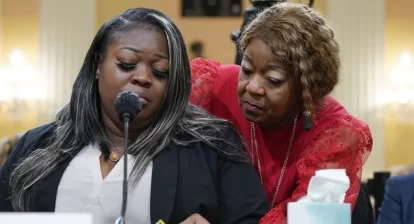
Natasha Rothwell’s “Belinda” in Season 3 of the popular HBO Max show came out on top with an alley-oop from her son Zion, and we’re not mad at all.
If you watched this season of “The White Lotus” just to cheer on the single returning Black cast member, Natasha Rothwell, you are not alone.
The show about a luxury hotel franchise that manages to have a guest die in location after location is the kind of rich-people social satire that draws a following in this day and age. It’s not a “Black show” per se, but Natasha Rothwell holding it down as “Belinda,” the only and lonely melanin staffer at the resort, is both relatable and easy to root for.
After last season’s ending (warning: spoiler ahead if you haven’t seen “The White Lotus” Season 1) where “Belinda” gets the short end of the stick, I, along with many other viewers, was left salty but unsurprised.
In that final episode, Tanya, a ritzy and ditzy bleached-blonde woman, casually pulls out of a promise to build a spa with Natasha’s character, crushing her spirit and only escape plan for a better life so Tanya could ride off into the sunset after her vacation.
It’s the kind of heartbreaking disappointment for Black folks you may come to expect on the big screen (conjure images of Oprah Winfrey’s character Sofia in “The Color Purple” being hauled off to jail only to work for Miss Minnie) or the real-life tragedies that often inspire them.
The finale fed the ever-present question: Why can’t we get a true happy ending? (I personally thought Tanya pulling out of the deal was very believable and realistic, but that’s a different convo).
Well, fast forward to Season 3, where “White Lotus” creator Mike White heard audience complaints loud and clear and made sure, this time, the narrative was shaken up.
In the finale of Season 3, not only does our Black heroine manage to avoid being killed off, she also leaves with a bag of money–a big bag.
“The ending was kinda the first thing I really thought of—”Belinda” leaving with money and leaving somebody in the same way she got left,” White said on the show’s official podcast episode recapping the season.
Although opinions differed on the pace and strength of this season’s “White Lotus” (many online critics complained it was too slow), there was widespread appreciation for “Belinda” getting her just due.
Breaking free of the “magical negro” or “mammy” tropes sometimes placed on Black female characters, “Belinda” freed herself from the burden of needing to be the “moral” character of the show who is unwilling to take blood(ish) money unofficially tied to the death of Tanya. Instead, “Belinda” decided she could keep the secret that Tanya’s ex-husband Gary was in Thailand as long as she had the means to tend to her own life elsewhere.
Of course, it didn’t hurt that “Belinda” had a little help from her son, the 20-something bright-eyed Zion, played by actor Nicholas DuVernay.
I loved that Mike White cast “Belinda’s” son “Zion” as an accomplished, MBA-pursuing young man. He wasn’t just greedy for a payout to his mom that he could benefit from or blow on sneakers and cars–he was an aspiring businessman eager to tackle the biggest negotiation of his life–even if it meant doing so with a possible murderer, the Greg-turned-Gary character played by Jon Gries. That took courage and just the right amount of youthful recklessness.
I also loved that White wrote the scene so well that viewers thought “Belinda” wasn’t in on her son’s plan to up the hush money ask from $100,000 to $5 million in the negotiation with Gary. Viewers find out after she storms out of the room and reveals her true intentions in the hallway with Zion that “Belinda” was willing to get down, too. They were both strategic and smart in that negotiation. Not just lucky Black characters benefiting from someone else’s generosity.
It was liberating that “Belinda” could finally think about what was best for her, and her alone, both from a professional and a personal standpoint.
There was much online chatter about how, in a full-circle moment, “Belinda” pulls out of her own deal with her career-aligned-native Thai boo-thing “Pornchai.” The two had made plans to go into business together, but as viewers pointed out, once “Belinda” is in a position of financial strength, she decides not to continue.
Natasha Rothwell explains it’s a less superficial move than some critics thought it was.
“I think that moment will feel like deja vu to the audience because of what happened to her, but I think if they look at it closely, you’ll see she’s departing with kindness,” says Rothwell on the show’s podcast. “She reiterates multiple times some things have changed and she just needs to wrap her head around those things, because her life just got really big.”
It was refreshing to see a Black female character leave a show like “The White Lotus” on top and unburdened after navigating a treacherous world where she had to wear many masks just to stay afloat. She had to keep her cool when she was mad, ignore dangerous people, and pretend she didn’t know what she knew.
Natasha Rothwell’s “Belinda” may have been a cast member in a show where many storylines compete for the audience’s attention, but in my mind, she won the audience’s affection by staying the course in the face of terror and uncertainty and thinking maybe—just maybe—things could work out in her favor.
Lucky for us, the showrunners had enough imagination to see it for her, too. More TV and movie writers should follow their lead.

Natasha S. Alford is the Senior Vice President of TheGrio. A recognized journalist, filmmaker, and TV personality, Alford is also the author of the award-winning book, “American Negra.” (HarperCollins, 2024) Follow her on Twitter and Instagram at @natashasalford.
!function(){var g=window;g.googletag=g.googletag||{},g.googletag.cmd=g.googletag.cmd||[],g.googletag.cmd.push(function(){g.googletag.pubads().setTargeting(“has-featured-video”,”true”)})}();






